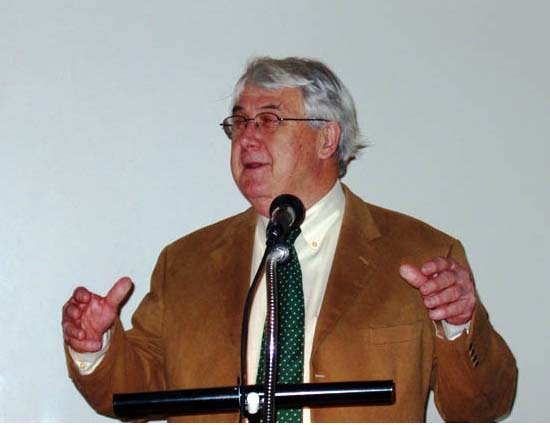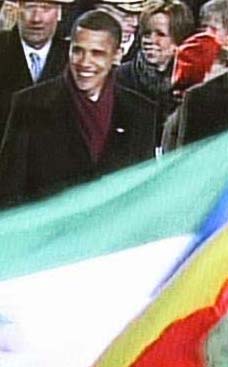
Kiniry was a seminary student in Washington D.C. during the 1960’s, when theological debates separated the Catholic community. As Kiniry listened to his teachers debate Vatican reforms, he paid attention to the Civil Rights marches and the changing social atmosphere in Washington. The rhetoric of the church did nothing to serve the movement on the streets. “I realized the faith did not make any sense,” he says now, “so I set out to search for what life was all about.” Kiniry withdrew from seminary, joined the Peace Corps, and left for India. A native of Delaware County, Kiniry returned to Philadelphia when he finished his Peace Corps service. Working as a stained glass artisan, he attended the meetings of a number of philosophical and social service groups. But the more he spoke with people, the more he questioned the purpose of religion. “You know,” he says, “you wonder about the meaning of life. But where is it if people don’t get what it means?”
India RPCV Richard Kiniry is leader of the Ethical Humanist Society of Philadelphia
Follow the Rabbit
Neo and Alice may have jumped into the Rabbit Hole, but most of us won’t sacrifice our security in the pursuit of Truth. We admire those who do, though—why else do we root for Frodo Baggins, ignore Jack Bauer’s ethics, and hope that Locke isn’t really dead on Lost? It’s easy to live vicariously through these characters; their quests encourage the notion that Truth exists without costing us anything. Because for many of us, the search for Truth does cost something: our illusions, our traditions, our ambitions. The scary thing is, we can’t know whether the risk will be worth it before we take it. We can, however, draw strength from the stories of others, like that of Richard Kiniry, leader of the Ethical Humanist Society of Philadelphia. Once he began his journey in 1968, he abandoned his path to the priesthood.
Kiniry was a seminary student in Washington D.C. during the 1960’s, when theological debates separated the Catholic community. As Kiniry listened to his teachers debate Vatican reforms, he paid attention to the Civil Rights marches and the changing social atmosphere in Washington. The rhetoric of the church did nothing to serve the movement on the streets. “I realized the faith did not make any sense,” he says now, “so I set out to search for what life was all about.” Kiniry withdrew from seminary, joined the Peace Corps, and left for India.
A native of Delaware County, Kiniry returned to Philadelphia when he finished his Peace Corps service. Working as a stained glass artisan, he attended the meetings of a number of philosophical and social service groups. But the more he spoke with people, the more he questioned the purpose of religion. “You know,” he says, “you wonder about the meaning of life. But where is it if people don’t get what it means?”
Instead of searching for a spiritual answer, Kiniry recognized religion as “a movement of like-minded people.” He became involved in the Ethical Cultural Movement and began concentrating on daily commitments that people can make to improve their quality of life. “The choices you make,” he emphasizes, “not only create yourself, but the world around you.”
The Ethical Cultural Movement was shaped by the nineteenth century writings of Felix Adler, John Dewey, and William James (among others). Founded in 1876, it emphasizes a naturalistic, humanistic philosophy, with no belief in the supernatural. At the center of the movement are pledges that people make to foster an ethical culture; these include commitments to self-reflection, integrity, democracy, and the humane treatment of others. The Ethical Society of Philadelphia is located at 1906 S. Rittenhouse Square, and Richard Kiniry has served as the clergy there for over twenty years. The Society holds talks on social justice every Sunday morning at 11 AM. Many of the fifty people who gather on a weekly basis are members of the Society, but all are welcome.
On weeknights, the Society also sponsors discussions open to the public. Last week, I attended one entitled “The Idea of God.” This specific talk was one of a three-part series centered on exploring human concepts of God. Led by Kiniry, the discussion group ranged in age from 31-65+. The seven of us included scholars, artists, and a couple of people who may not have had anywhere else to go. Kiniry led the talk, encouraging a discussion of quotes he pulled from a book called God is the Good We Do, by Michael Benedikt. Kiniry is a good discussion leader; his questions provoke thought without insinuating answers. And as I sat listening to an artist and a retiree argue about whether or not “God” can be identified with the word “Love,” I smiled. I had forgotten that atheists can be just as dogmatic as evangelicals. Still, it’s comforting to know that these corners of the city exist - places where people of any class, rage, or age can gather to discuss ideas that threaten our illusions of safety.
Tonight is movie night at the Ethical Society. They will be showing “The Threat to the Planet: The Dark and Bright Side of Global Warming,” a film by James E. Hansen, the Director of NASA’s Goddard Institute for Space Studies. Tomorrow night, they are hosting a 200th birthday bash for Charles Darwin. Festivities start at 7:00 PM. More information on these events and upcoming lectures can be found on their website: www.phillyethics.net.
Image Credit: Flickr user TheAlieness GiselaGiardino













